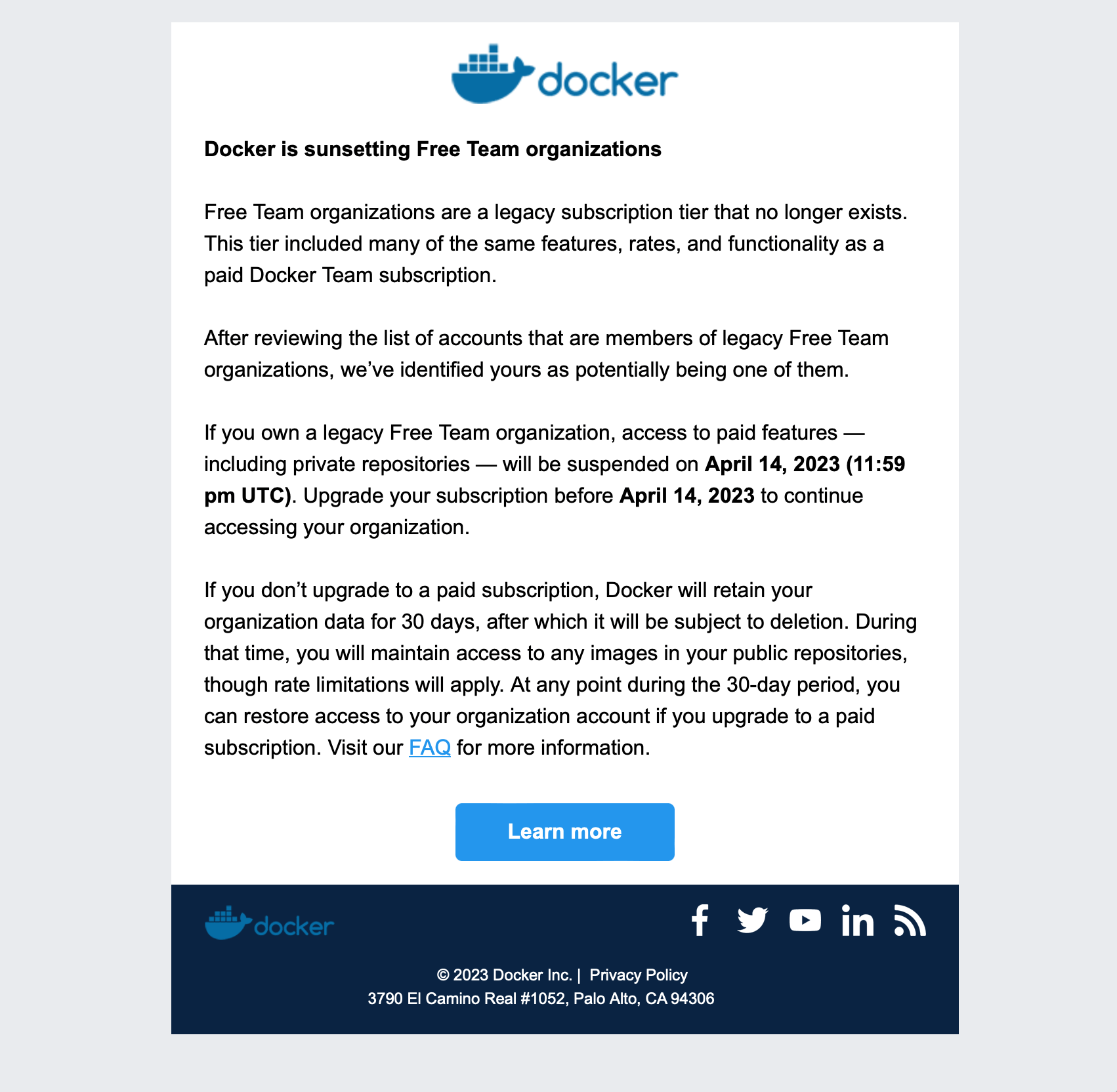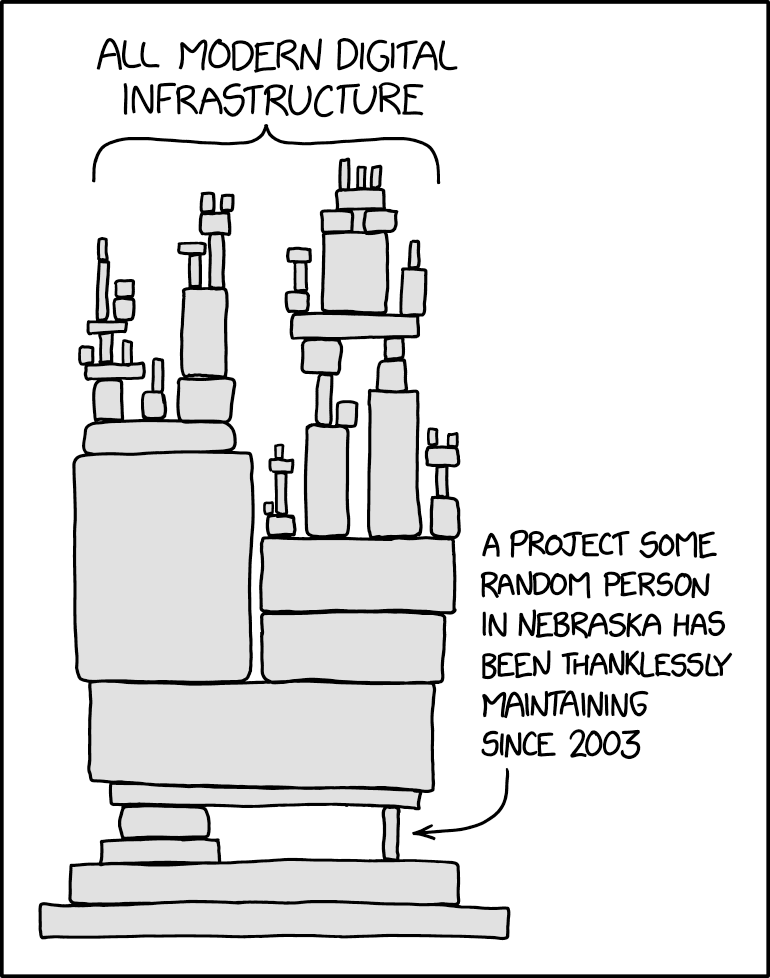Even if you don’t have a team organization and what you can do about it.
Docker Inc. continues on its course of eliminating free offerings: Now the “Docker Free Team” model has to take its turn. With the «Free Team Organizations» offering, it was possible to publish public container images for free in Docker Hub. Many open-source projects have taken advantage of the offer; however, the impact is affecting everyone.
Organizations and open-source projects owning such Docker Hub accounts received an email in March 2023 with the subject «Docker is sunsetting Free Team organizations».
This announcement has upset many open-source project maintainers. Social Media feeds on Twitter, Reddit, and LinkedIn are full of indignation and incomprehension. A few days later, Docker clarified their positions in a Q&A blob post called We apologize. We did a terrible job announcing the end of Docker Free Teams. More about the content later.
Although this change may appear to only impact open-source projects, in reality it is impacting anyone who is working with containers. This announcement is a wake-up call to a new era in container image management.
Let’s analyze and break down the buzz around the announcement, as well as the short and long-term impact on container image users and creators.
What is the content of the announcement, exactly? I paraphrased the contractual language of the original announcement into an easier to understand language, adding some context to the text.
Docker is discontinuing its Free Team Organization subscription tier on Docker Hub. This legacy tier provided similar features and functionality to the currently available paid Docker Team subscription. Organizations who own such a legacy Free Team organization subscription will be suspended on April 14, 2023, unless they upgrade to the current paid subscription before that date. After that date, Docker will retain the data for 30 more days before potentially deleting them. Upgrading to a paid subscription during the 30-day period will restore access to your organization account.
Here is the full announcements if you still want to read it.
Docker is sunsetting Free Team organizations
Free Team organizations are a legacy subscription tier that no longer exists. This tier included many of the same features, rates, and functionality as a paid Docker Team subscription.
After reviewing the list of accounts that are members of legacy Free Team organizations, we’ve identified yours as potentially being one of them.
If you own a legacy Free Team organization, access to paid features — including private repositories — will be suspended on April 14, 2023 (11:59 pm UTC). Upgrade your subscription before April 14, 2023 to continue accessing your organization.
If you don’t upgrade to a paid subscription, Docker will retain your organization data for 30 days, after which it will be subject to deletion. During that time, you will maintain access to any images in your public repositories, though rate limitations will apply. At any point during the 30-day period, you can restore access to your organization account if you upgrade to a paid subscription. Visit our FAQ for more information.

The announcement, as we’ve already learned, has caused an outcry in the open-source projects. Most users, including you, will notice the change next month, and it will last for many years to come.
What is the impact going to be, you might ask?

In Dockers followup post, there is some relativization to that statement. Images will not be deleted, but it won’t be possible to push newer versions. Many organizations well become or appear abandoned on Docker Hub.
Small and indy open-source projects are now hectically seeking an alternative to Docker Hub, as they want to avoid the $300 per year. Although Docker has a Sponsored Open-Source Program (DSOP) many open-source projects aren’t eligible to participate in it because of the clause that excludes the pathway to commercialization.
Not have a pathway to commercialization. Your organization must not seek to make a profit through services or by charging for higher tiers. Accepting donations to sustain your efforts is permissible.
The reason behind this clause is that Docker has another partner program, which is called the Docker Verified Publisher Program. That program is targeting ISVs and open-source who have a commercial offering. According to our sources, this program is somewhere in the 5 figures ballpark, and much more lucrative than the $300 yearly tier. Furthermore, numerous open-source developers complain that they never received any feedback from Docker after applying for the sponsorship program in the past.
The first thing to take away from this is that while your data or container images are under your
control, the access to the data is not. It is possible to move the data away from Docker Hub or any
other provider for that matter, you cannot take access to the data with you. With access, I mean
that the images are now reachable via a different location. E.g. ghcr.io/reponame/app:1.2.3 and
not
awesome-project/app/1.2.3 like on Docker Hub. This change in access has a big impact on the
consumer, the project branding and its reachability. Documentation needs to be updated, dependent
projects or consumers should be informed, which in the case of open-source projects is often
difficult or impossible. In cased
of, printed books or external
tutorials, they can’t be changed.
The second takeaway is that this is the second major change in Docker Hub after the Rate limit announcement a year ago. This means that Docker Inc. will push forward to cut down on free service offerings and raise prices. Docker no longer needs to generate demand and grow the container technology market as containers are a de facto standard.
Moreover, maintaining and supporting this vast amount of constantly growing data that users generate is hardly sustainable. Even after the uproar in the community and the partial roll back, it is clear that other changes will follow.
As an organization that is offering an alternative product to Docker Hub, we are proud that our customers not only own their data, but also own and control the access to their data. Our registries are running under your custom domain, so you have the freedom and the possibility to move data and the access to the data.

We are offering a highly discounted dedicated container to Open-Source projects who want to maintain their data, access, and its distribution.
Published — March 17, 2023